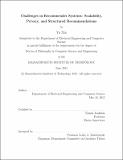Challenges in recommender systems : scalability, privacy, and structured recommendations
Author(s)
Xin, Yu, Ph. D. Massachusetts Institute of Technology
DownloadFull printable version (1.504Mb)
Other Contributors
Massachusetts Institute of Technology. Department of Electrical Engineering and Computer Science.
Advisor
Tommi Jaakkola.
Terms of use
Metadata
Show full item recordAbstract
In this thesis, we tackle three challenges in recommender systems (RS): scalability, privacy and structured recommendations. We first develop a scalable primal dual algorithm for matrix completion based on trace norm regularization. The regularization problem is solved via a constraint generation method that explicitly maintains a sparse dual and the corresponding low rank primal solution. We provide a new dual block coordinate descent algorithm for solving the dual problem with a few spectral constraints. Empirical results illustrate the effectiveness of our method in comparison to recently proposed alternatives. In addition, we extend the method to non-negative matrix factorization (NMF) and dictionary learning for sparse coding. Privacy is another important issue in RS. Indeed, there is an inherent trade-off between accuracy of recommendations and the extent to which users are willing to release information about their preferences. We explore a two-tiered notion of privacy where there is a small set of public users who are willing to share their preferences openly, and a large set of private users who require privacy guarantees. We show theoretically, and demonstrate empirically, that a moderate number of public users with no access to private user information already suffices for reasonable accuracy. Moreover, we introduce a new privacy concept for gleaning relational information from private users while maintaining a first order deniability. We demonstrate gains from controlled access to private user preferences. We further extend matrix completion to high-order tensors. We illustrate the problem of recommending a set of items to users as a tensor completion problem. We develop methods for directly controlling tensor factorizations in terms of the degree of nonlinearity (the number of non-uniform modes in rank-1 components) as well as the overall number of rank-1 components. Finally, we develop a tensor factorization for dependency parsing. Instead of manually selecting features, we use tensors to map high-dimensional sparse features into low dimensional (dense) features. Our parser achieves state of the art results across multiple languages.
Description
Thesis: Ph. D., Massachusetts Institute of Technology, Department of Electrical Engineering and Computer Science, 2015. This electronic version was submitted by the student author. The certified thesis is available in the Institute Archives and Special Collections. Cataloged from student-submitted PDF version of thesis. Includes bibliographical references (pages 121-128).
Date issued
2015Department
Massachusetts Institute of Technology. Department of Electrical Engineering and Computer SciencePublisher
Massachusetts Institute of Technology
Keywords
Electrical Engineering and Computer Science.